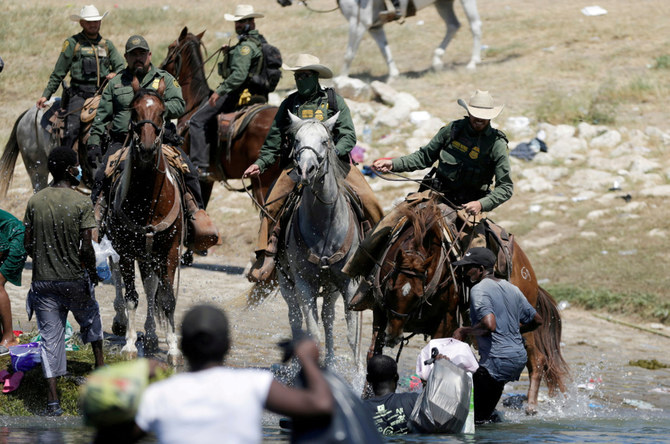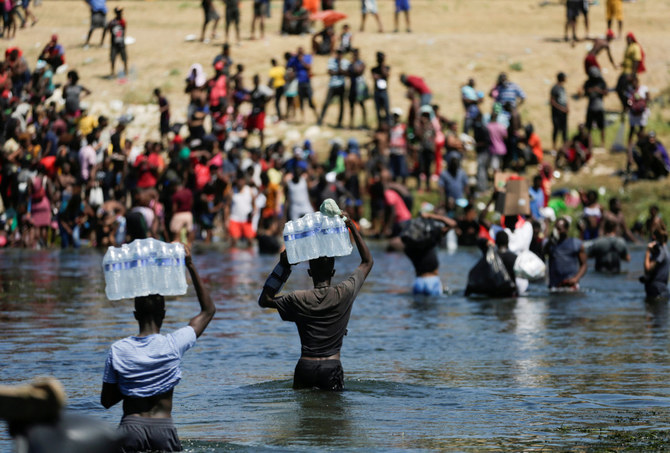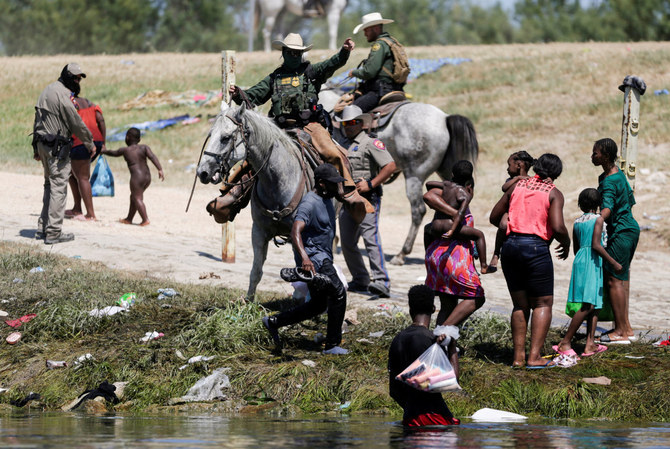DEL RIO, Texas: The US flew Haitians camped in a Texas border town back to their homeland Sunday and tried blocking others from crossing the border from Mexico in a massive show of force that signaled the beginning of what could be one of America’s swiftest, large-scale expulsions of migrants or refugees in decades.
More than 320 migrants arrived in Port-au-Prince on three flights, and Haiti said six flights were expected Tuesday. In all, US authorities moved to expel many of the more 12,000 migrants camped around a bridge in Del Rio, Texas, after crossing from Ciudad Acuña, Mexico.
The US plans to begin seven expulsion flights daily on Wednesday, four to Port-au-Prince and three to Cap-Haitien, according to a US official who was not authorized to discuss the matter publicly. Flights will continue to depart from San Antonio but authorities may add El Paso, the official said.
The only obvious parallel for such an expulsion without an opportunity to seek asylum was in 1992 when the Coast Guard intercepted Haitian refugees at sea, said Yael Schacher, senior US advocate at Refugees International whose doctoral studies focused on the history of US asylum law.
Similarly large numbers of Mexicans have been sent home during peak years of immigration but over land and not so suddenly.
Central Americans have also crossed the border in comparable numbers without being subject to mass expulsion, although Mexico has agreed to accept them from the US under pandemic-related authority in effect since March 2020. Mexico does not accept expelled Haitians or people of other nationalities outside of Mexico, Guatemala, Honduras and El Salvador.
When the border was closed Sunday, the migrants initially found other ways to cross nearby until they were confronted by federal and state law enforcement. An Associated Press reporter saw Haitian immigrants still crossing the river into the US about 1.5 miles (2.4 kilometers) east of the previous spot, but they were eventually stopped by Border Patrol agents on horseback and Texas law enforcement officials.
As they crossed, some Haitians carried boxes on their heads filled with food. Some removed their pants before getting into the river and carried them. Others were unconcerned about getting wet.
Agents yelled at the migrants who were crossing in the waist-deep river to get out of the water. The several hundred who had successfully crossed and were sitting along the river bank on the US side were ordered to the Del Rio camp. “Go now,” agents yelled. Mexican authorities in an airboat told others trying to cross to go back into Mexico.
Migrant Charlie Jean had crossed back into Ciudad Acuña from the camps to get food for his wife and three daughters, ages 2, 5 and 12. He was waiting on the Mexican side for a restaurant to bring him an order of rice.
“We need food for every day. I can go without, but my kids can’t,” said Jean, who had been living in Chile for five years before beginning the trek north to the US It was unknown if he made it back across and to the camp.
Mexico said Sunday it would also begin deporting Haitians to their homeland. A government official said the flights would be from towns near the US border and the border with Guatemala, where the largest group remains.
Haitians have been migrating to the US in large numbers from South America for several years, many having left their Caribbean nation after a devastating 2010 earthquake. After jobs dried up from the 2016 Summer Olympics in Rio de Janeiro, many made the dangerous trek by foot, bus and car to the US border, including through the infamous Darien Gap, a Panamanian jungle.
Some of the migrants at the Del Rio camp said the recent devastating earthquake in Haiti and the assassination of President Jovenel Moïse make them afraid to return to a country that seems more unstable than when they left.
“In Haiti, there is no security,” said Fabricio Jean, a 38-year-old Haitian who arrived in Texas with his wife and two daughters. “The country is in a political crisis.”
Since Friday, 3,300 migrants have already been removed from the Del Rio camp to planes or detention centers, Border Patrol Chief Raul L. Ortiz said Sunday. He expected to have 3,000 of the approximately 12,600 remaining migrants moved within a day, and aimed for the rest to be gone within the week.
“We are working around the clock to expeditiously move migrants out of the heat, elements and from underneath this bridge to our processing facilities in order to quickly process and remove individuals from the United States consistent with our laws and our policies,” Ortiz said at news conference at the Del Rio bridge. The Texas city of about 35,000 people sits roughly 145 miles (230 kilometers) west of San Antonio.
Six flights were scheduled in Haiti on Tuesday — three in Port-au-Prince and three in the northern city of Cap-Haitien, said Jean Négot Bonheur Delva, Haiti’s migration director.
The rapid expulsions were made possible by a pandemic-related authority adopted by former President Donald Trump in March 2020 that allows for migrants to be immediately removed from the country without an opportunity to seek asylum. President Joe Biden exempted unaccompanied children from the order but let the rest stand.
Any Haitians not expelled are subject to immigration laws, which include rights to seek asylum and other forms of humanitarian protection. Families are quickly released in the US because the government cannot generally hold children.
Some people arriving on the first flight covered their heads as they walked into a large bus parked next to the plane. Dozens lined up to receive a plate of rice, beans, chicken and plantains as they wondered where they would sleep and how they would make money to support their families.
All were given $100 and tested for COVID-19, though authorities were not planning to put them into quarantine, said Marie-Lourde Jean-Charles with the Office of National Migration.
Gary Monplaisir, 26, said his parents and sister live in Port-au-Prince, but he wasn’t sure if he would stay with them because to reach their house he, his wife and their 5-year-old daughter would cross a gang-controlled area called Martissant where killings are routine.
“I’m scared,” he said. “I don’t have a plan.”
He moved to Chile in 2017, just as he was about to earn an accounting degree, to work as a tow truck driver. He later paid for his wife and daughter to join him. They tried to reach the US because he thought he could get a better-paying job and help his family in Haiti.
“We’re always looking for better opportunities,” he said.
Some migrants said they were planning to leave Haiti again as soon as possible. Valeria Ternission, 29, said she and her husband want to travel with their 4-year-old son back to Chile, where she worked as a bakery’s cashier.
“I am truly worried, especially for the child,” she said. “I can’t do anything here.”
US launches mass expulsion of Haitian migrants from Texas
https://arab.news/gpum2
US launches mass expulsion of Haitian migrants from Texas

- More 12,000 migrants, mostly Haitians, had camped around a bridge in Del Rio, Texas, after crossing from Ciudad Acuña, Mexico
Epstein files reveal links to cash, women, power in Africa

- Documents attest to Epstein’sclose ties with Karim Wade, son of former Senegalese president Abdoulaye Wade
- They also reveal his ties to Nina Keita, niece of Ivorian president Alassane Ouattara
PARIS: Jeffrey Epstein built close ties with powerful figures in Senegal and Ivory Coast, files released by the US government last month show, detailing the late sex offender’s influence network across Africa.
Emails, scheduled meetings, investment projects, and loans reviewed by AFP attest to the disgraced New York financier’s close relationship with Karim Wade, son of former Senegalese president Abdoulaye Wade.
They also reveal his ties to Nina Keita, niece of Ivorian president Alassane Ouattara.
Wade and Epstein met in 2010 through Emirati businessman Sultan Ahmed bin Sulayem, who recently resigned as CEO of port giant DP World after mounting pressure over his close friendship with Epstein.
The pair quickly struck up a rapport.
“Thanks for coming. I think there are many things to consider... I feel confident that we will have fun,” Epstein wrote to Wade on November 15, 2010 after their first meeting in Paris.
“Have a safe trip back to your paradise Island,” Wade replied.
While Wade’s exchanges show no link to Epstein-related sex trafficking crimes, they do reveal conversations on potential business ventures in various sectors, such as finance and energy.
Nicknamed the “Minister of Heaven and Earth” for the multiple portfolios he held including international cooperation, energy, and air transport, Wade was a powerful figure in Senegal until April 2012, when his father’s bid for a third term sparked deadly riots.
Epstein saw him as “one of the most important players in africa” and invited him to meet close contacts such as Ehud Barak, then Israel’s defense minister.
He also put him in touch with Chinese businessman Desmond Shum to discuss “offshore banking.”
The US Department of Justice documents show Shum and Wade met in Beijing on May 9, 2011.
That same month, Wade planned an African tour through Senegal, Mali, and Gabon for Epstein.
‘You will not suffer’
Epstein and Wade’s relationship became even more apparent after the latter’s fortunes reversed when his father left office in 2012.
That autumn, Epstein proposed that his “friend” — under the Dakar authorities’ scrutiny over his assets — use his house in Florida.
“You and your family are welcome to use my house in palm beach, staff is there, pool etc. you will not suffer,” Epstein wrote.
“Txs a lot Brother for the advise,” Wade replied a few weeks later to another email, in which Epstein urged him to “stay mentally strong.”
Numerous files suggest Epstein became financially involved on Karim Wade’s behalf after his arrest in 2013 and his 2015 sentencing to six years in prison for corruption.
Karim Wade’s lawyer, Mohamed Seydou Diagne, sent two invoices in May 2014 and July 2015 of $500,000 to one of Epstein’s companies.
Contacted by AFP on Monday, Diagne said he “did not consider it useful to comment.”
Other archives suggest that Epstein covered at least $50,000 in fees for the US lobbying firm Nelson Mullins, hired by Wade’s entourage to secure his release.
Epstein regularly exchanged emails with Robert Crowe, a partner at the firm who kept him informed of their efforts in the US and Senegal.
In a June 16, 2016 email thread where Epstein and Crowe discussed whether then Senegalese president Macky Sall would pardon Wade, Crowe writes: “He has told my friends high up at State that he was going to do it. They have been putting pressure on him!“
Karim Wade was released from prison eight days later, on June 24, and went into exile in Qatar, which he credited for efforts toward his release.
Jeffrey Epstein was told by Sultan Ahmed bin Sulayem and Nina Keita.
‘A very interesting person!’
The DOJ documents show Nina Keita was close to both Epstein and Karim Wade and that she acted as a regular intermediary while Wade was in prison.
Keita also helped put Epstein in contact with her uncle, president of Ivory Coast since May 2011, and his team.
“He thought you were a very interesting person! ... they were all very happy to have you here,” she wrote on January 20, 2012, after the financier’s visit to Abidjan.
She had booked him the “ministerial suite” of the luxury Hotel Ivoire for that trip.
Ahead of the visit, Epstein had said he hoped to see “very pretty girls there, as well as interesting places.”
“You will!” Keita replied.
Emails show Keita, a former model, at least once sent photos and the phone number of a young woman to Epstein.
He then met this woman at the Ritz hotel in Paris on August 31, 2011.
“ask sadia to send pictures of her sister. i prefer under 25,” Epstein wrote to Keita after the meeting.
Now the deputy general director of Ivorian petroleum stocks company GESTOCI, Keita also appears in a February 2019 will in which Epstein requested that debts owed to him by a number of people be canceled upon his death.
AFP received no response to its requests for comment from both Keita and the Ivorian presidency, or from Karim Wade, who was contacted through his entourage.
The mere mention of a person’s name in the Epstein files does not in itself imply wrongdoing.
















